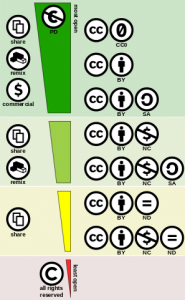What is a Creative Commons (C.C.) License?
Creative Commons (C.C.) offers licenses that run parallel to U.S. copyright law. These licenses provide a way for authors to communicate how others can use their materials. Creative Commons offers six flexible copyright licenses that authors can choose from.
Here are some FAQs about Creative Commons and the licenses that they offer.
How do the CC Licenses work?
(1) Decide how you want others to use your work. Licenses range from a “free culture” license that indicates anyone can use your content however they want without giving you credit to licenses that require content users to share their content in the same way, provide attribution, or limit uses to non-commercial purposes.

(2) Append a license to your content. You can generate a license using this tool on the Creative Commons website. Then you can add a license to the footer of your OER or document, in a description of a photo you post, or as a caption underneath original content. If you upload and host original content on platforms like Flicker, Prezi, or Soundcloud you may have the option to embed a license with your content and then can link out to it from your OER.
How do C.C. Licenses work with O.E.R.?
In two ways:
- You can append a C.C. License to your whole O.E.R. or to different content elements (like images, powerpoint slides, or videos) that you create. See the footer of this O.E.R. module for an example of this.
- You can search for CC Licensed materials that other people have created to incorporate into your O.E.R. and be sure to follow specifications of use when you incorporate this content into your site. See the caption below the chart above which provides attribution to Creative Commons, the copyright holder for this graphic.
How do I find C.C. Licensed content to use in my O.E.R.?
Use O.E.R. repositories with content that others have licensed for reuse. Or use the creative commons search feature to find C.C. licensed materials on the open web.
Do I have to use a C.C. License while developing my O.E.R.?
Yes. One of the things that make O.E.R. O.E.R. is their capacity to be reused and adapted. Without a license, re-usability is limited and your O.E.R. isn’t really “open” for other people to use. C.C. licenses also guarantee that when other people adapt your work, you’ll be properly attributed.
Some important things to Keep in Mind…
- Often, copyright and reuse policies for content on websites or repositories can be found under “permissions” in a footer.
- If content you find online doesn’t have a CC license that means it’s automatically copyrighted and the rights to distribute, perform, etc belong exclusively to the rights holder.
- Sometimes, when you upload or publish your work in certain social media or scholarly platforms, the terms of service that you agree to when you sign up contains a copyright rider. For example: any images that you post on Instagram become free for other people to reuse or repost; many academic publishers ask you to sign a contract that includes a transfer of your copyright to the publisher; Openlab sites all have a default Creative Commons license (CC-BY-NC-SA) but you can make your site or content you post less restrictive if you’d like to by creating a custom footer.



